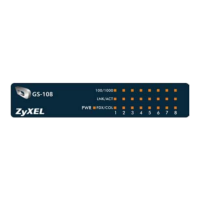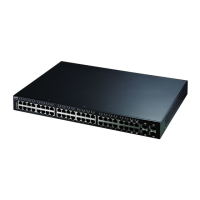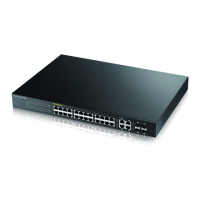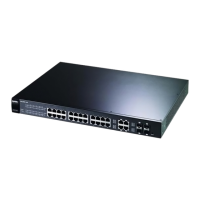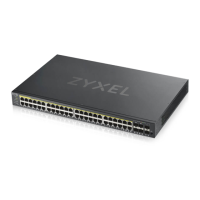Chapter 49 Diagnostic
GS3700/XGS3700 Series User’s Guide
483
The following table describes the labels in this screen.
Table 243 Management > Diagnostic
LABEL DESCRIPTION
Ping Test
IPv4 Select this option if you want to ping an IPv4 address, and select which traffic flow (in-
band or out-of-band) the Switch is to send ping frames.
If you select in-band, the Switch sends the frames to all ports except the management
port (labelled MGMT).
If you select out-of-band, the Switch sends the frames to the management port
(labelled MGMT).
Otherwise, select - to send ping requests to all VLANs on the Switch.
IPv6 Select this option if you want to ping an IPv6 address. You can also select vlan and
specify the ID number of the VLAN to which the Switch is to send ping requests.
Otherwise, select - to send ping requests to all VLANs on the Switch.
Count Enter the num ber of ICMP Echo Request (ping) messages the Switch continuously sends.
IP Address/
Host Name
Type the IP address or host name of a device that you want to ping in order to test a
connection.
Click Ping to have the Switch ping the IP address.
Trace Route Test
IPv4 Select this option if you want to trace the route packets take to a device with an I Pv4
address, and select in-band or out-of-band on which the Switch traces the path.
Otherwise, select - to trace the path on any VLAN.
IPv6 Select this option if you want to trace the route packets take to a device with an I Pv6
address.
TTL Enter the Time To Live (TTL) value for the ICMP Echo Request packets. This is to set the
maximum number of the hops (routers) a packet can travel through. Each router along
the path will decrement the TTL value by one and forward the packets. When the TTL
value becomes zero and the destination is not found, the router drops the packets and
informs the sender.
Wait Time Specify how many seconds the Switch waits for a response to a probe before running
another traceroute.
Queries Specify how many times the Switch performs the traceroute function.
IP Address/
Host Name
Enter the I P address or host name of a device to which you want to perform a
traceroute.
Click Trace Route to have the Switch perform the traceroute function. This determines
the path a packet takes to the specified device.
Ethernet Port Test Enter a port number and click Port Test to perform an internal loopback test.
Cable Diagnostics Enter a port number and click Diagnose to perform a physical wire-pair test of the
Ethernet connections on the specified port(s). The following fields display when you
diagnose a port.
Port This is the number of the physical Ethernet port on the Switch.
Channel An Ethernet cable usually has four pairs of wires. A 10BASE-T or 100BASE-TX port only
use and test two pairs, while a 1000BASE-T port requires all four pairs.
This displays the descriptive name of the wire-pair in the cable.
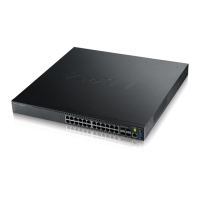
